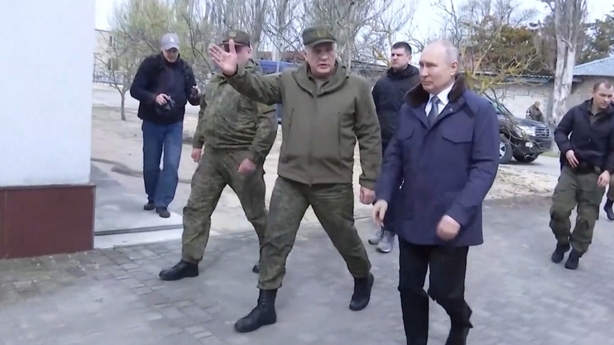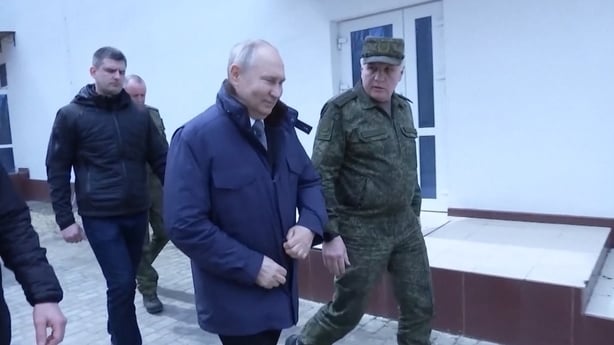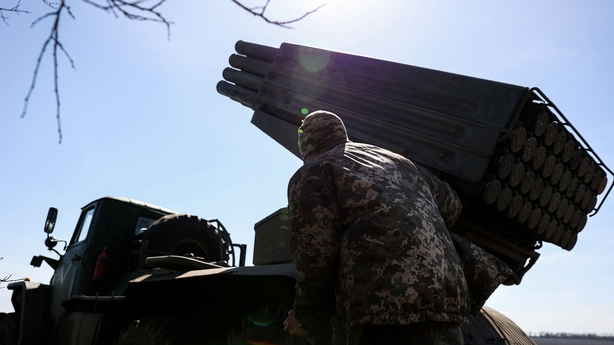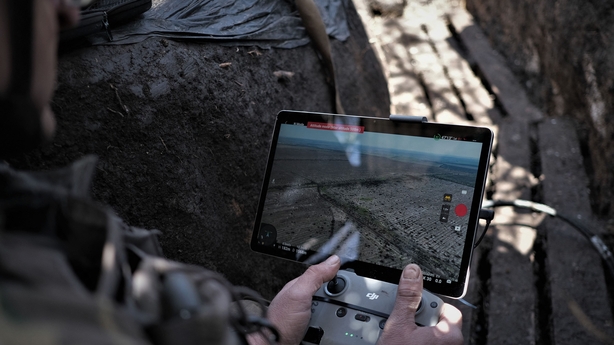Ukrainian President Volodymyr Zelensky has visited troops in the small eastern city of Avdiivka, thanked them for their service and was briefed by commanders on the battlefield situation, his office said.
Avdiivka has been one of the main targets of a Russian winter offensive which was intended to reinvigorate Moscow's full-scale invasion, launched in February 2022, but has made only small territorial advances in the east.
Video footage released by Mr Zelensky's office showed him addressing troops in combat gear and handing them awards in what appeared to be a large industrial warehouse with sandbags packed against at least one of the high walls.
"I have the honour to be here today, to thank you for your service, for defending our land, Ukraine, our families," he said. "I wish you only victory - this is what I wish for every Ukrainian, this is what is very important to all of us."
Mr Zelensky also visited a hospital where he met wounded soldiers and handed out awards.
The video footage also showed heavily damaged high-ris eresidential buildings in Avdiivka, where officials say about1,800 civilians remain.
Mr Zelensky has visited troops several times in recent weeks before what is widely expected to be a Ukrainian counteroffensive.
He was accompanied in Avdiivka by Andriy Yermak, the head of his office, who said Ukrainian troops were preventing Russia encircling the city.
He said fierce battles were under way elsewhere in the region, and that "successful defence" was key in these places.
"Our army has already broken the enemy's plans to breakthrough the (Ukrainian) defences and advance in the east,"Mr Yermak said on the Telegram messaging app
Kremlin says Putin visited Kherson, Luhansk regions
Earlier, the Kremlin said that Russian President Vladimir Putin had visited Ukraine's Kherson and Luhansk regions to meet military commanders.
"The supreme commander of Russian Federation armed forces has visited the headquarters of the Dniepr military grouping" in the Kherson region in the south, as well as Russian national guard headquarters in the Luhansk region in the east, the Kremlin said in a statement.
It said the trip took place yesterday.


It marked the first time Mr Putin has visited the two regions, which are partly controlled by Russian troops, since Moscow annexed them along with two other Ukrainian regions last September.
"It's important for me to hear your opinion on the situation, to listen to you and to exchange information," Mr Putin said in a video released by the Kremlin.
The Russian leader wished the troops a happy Easter, which Orthodox Christians marked on Sunday, the Kremlin said.
Kherson, Zaporizhzhia and Luhansk, in the east, are three of the four regions that Mr Putin proclaimed annexed last September.
Ukraine and its Western allies rejected the annexations and Russian forces only partly hold the regions.
Russian troops retreated from the city of Kherson, the regional capital, last November, and have been reinforcing their positions on the opposite bank of the Dnipro river in anticipation of a Ukrainian counter-offensive.
While numerous Western leaders have made their way to Kyiv for talks with President Zelensky since Russian forces invaded 14 months ago, Mr Putin has rarely visited parts of Ukraine under Russia's control.
Last month, he visited the Crimea region and the city of Mariupol.

Russia says its "special military operation" in Ukraine, launched on 24 February last year, was necessary to protect its security against what it sees as a hostile and aggressive West.
Ukraine and its Western allies say Russia is waging an unprovoked war aimed at grabbing territory.
A Russian winter offensive failed to make much progress and its troops have been bogged down in a series of battles in the east and south, where advances have been incremental and come at a huge cost to both sides.
A Ukrainian counter-offensive has long been expected after the months of attritional warfare.
Stepping up pressure on Kyiv and its Western supporters, Mr Putin said last month said Russia would station shorter-range, so-called tactical nuclear weapons in close ally Belarus, which also borders Ukraine.
Russia says the deployment was forced upon it by the expansion of the NATO military alliance towards its borders.
It was the first time Russia had said it would station nuclear weapons on the territory of another country since the end of the Cold War three decades ago, and appeared to raise the stakes, at least symbolically, in an intensifying standoff with the West over the war in Ukraine.
In Japan, G7 foreign ministers this morning condemned Russia's plan to station nuclear weapons in Belarus as "unacceptable".
"Russia's irresponsible nuclear rhetoric and its threat to deploy nuclear weapons in Belarus are unacceptable," the ministers said in a communique at the end of a three-day meeting in Japan.

"Any use of chemical, biological or nuclear weapons by Russia would be met with severe consequences."
The war in Ukraine has killed tens of thousands of people, levelled cities, forced millions from their homes and raised fears of a global food shortage because of disruption to grain supplies.
But the latest alarm over food appeared to be over as Russia's RIA news agency, citing the Russian foreign ministry, said inspections of ships moving grains from Ukraine have restarted after a pause that threatened to shut down the Black Sea shipping corridor.
A ministry official quoted by RIA blamed yesterday's interruption on Ukraine's failure to observe agreed procedures but said the issue has been resolved.
Kyiv said the UN-brokered initiative allowing the safe Black Sea export of Ukrainian grain was in danger of shutting down after Russia blocked inspections of participating ships in Turkish waters.
Pyotr Ilyichyov, head of the international organisations department at Russia's foreign ministry, told RIA the passage of grain ships depended both on the weather and on how well they observed the procedures.
It remains unclear if the grain deal, in place since last July, will be renewed, as Russia complains another agreement, aimed at facilitating its own agricultural and fertiliser exports, has not been upheld.
US Secretary of State Antony Blinken said Russia was breaking its promises to countries around the world that are dependent on grain from the region.
